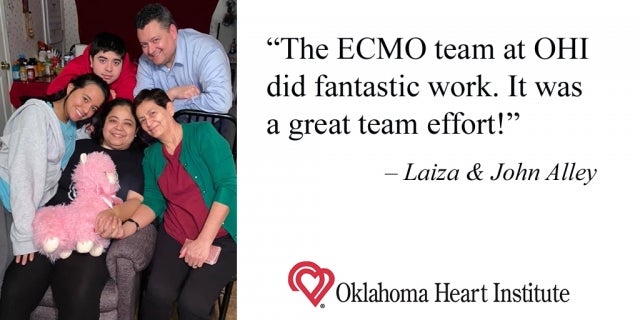Seriously ill COVID-19 patients in northeast Oklahoma are finding new hope for recovery thanks to technology being used at Oklahoma Heart Institute (OHI).
The technology is called an ECMO machine, which stands for extracorporeal membrane oxygenation. One of only three machines in the state, the ECMO at OHI acts as an artificial heart, an artificial lung or both, depending on the patient’s needs.
The ECMO machine can also be placed in an ambulance, so health care providers can travel to a patient and connect them to the machine sooner, thereby saving hours of time, and often the patient’s life.
That was the situation for Laiza Alley, 42, a medical support assistant at the Jack C. Montgomery VA Medical Center in Muskogee. She contracted COVID-19 in December 2020, just as the vaccines were being introduced.
As her illness progressed, Alley started having trouble breathing, eventually being admitted to the local hospital with COVID pneumonia. Due to her worsening condition, she was intubated, which meant a breathing tube was placed down her throat and oxygen was pushed into her lungs. Alley was also transferred to the ICU.
“I was not doing well,” she said. “They had me on the highest level of oxygen and yet I was still gasping for air. I remember seeing my husband, John, being called out into the hallway to talk to the nurse. The next thing I remember was waking up at OHI.”
Wearing a gown, mask and full protective gear because of the coronavirus, her husband was called out into the hallway. John was told that there wasn't much more the hospital could do for Laiza, but that her doctor recommended that she be placed on ECMO and sent to OHI.
“I didn't know much about ECMO at the time,” said John. “But her condition was very fragile and this was pretty much her last resort. So I said, ‘Let’s do it.’”
The ECMO team drove to Muskogee to place Laiza in the mobile ECMO ambulance for transfer back to Tulsa. She continued to be intubated and later received a tracheotomy.
“Once they took the breathing tube out and put the trache in, it was a big change for the better,” said John. “Her numbers improved and she was awake and coherent. She still couldn’t speak, but I saw a huge improvement in her facial expressions. I think that was first time I’d seen her smile for a long while. I finally realized this was going to work!”
After a few days, Laiza was transferred from the ICU to the step down unit and given a speaking valve in her trache. Her husband didn’t even notice it when he walked into the room.
“Hello,” Laiza said to John. His mind on other things, John instinctively answered back, “Hey.” “Oh,” the smiling speech therapist said. “I guess he doesn’t want to talk to you.”
That’s when John realized what was going on.
“Wait! You can talk,” he said. “That’s awesome!”
Laiza spent nearly a month in the care of the ECMO team at OHI before returning home.
Both John and Laiza remain very grateful to the entire ECMO team.
“I was appreciative of the full team effort on their part,” said John.
“The nurses were all so kind and always checked on me,” said Laiza.
Laiza Alley was one of 71 ECMO patients treated by Oklahoma Heart Institute in 2021. Read more about ECMO here.

